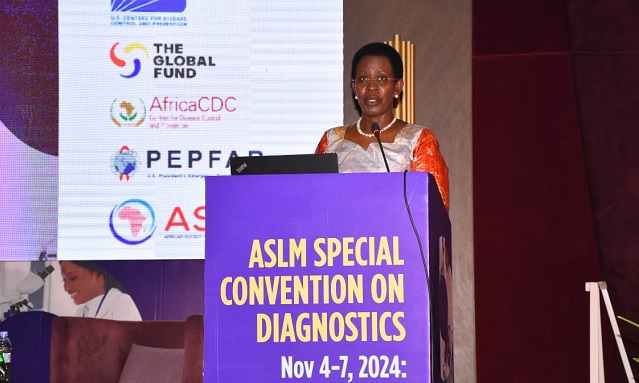
KAMPALA, UGANDA | THE INDEPENDENT | The Ministry of Health has called on African countries to collaborate in vaccine manufacturing to prevent a recurrence of the COVID-19 vaccine hoarding that left many nations vulnerable.
Speaking at the opening of the Africa Special Convention on Diagnostics on Tuesday, Health Ministry Permanent Secretary Dr. Diana Atwine emphasized the importance of cooperation over competition among African nations to ensure they are better prepared for future outbreaks.
In 2022, the World Health Organization (WHO) selected six African countries, including Egypt, Kenya, Nigeria, Senegal, and South Africa, for technological support to begin vaccine production. Although this initiative has yet to make substantial progress, additional efforts, such as the launch of the African Vaccine Manufacturing Accelerator in June, aim to establish local vaccine production across Africa.
While these steps are underway, Atwine stressed the urgency for faster action, warning of increasing virus mutations. She noted that Uganda has been profiling several viruses, some of which have not yet been classified as concerning.
Atwine also highlighted the need for a common database for laboratories across the continent, which would streamline knowledge sharing and support rapid response to epidemics. She suggested that amending laboratory policies and governance to allow for data sharing would benefit all countries involved.
At the convention, President Yoweri Museveni was honored for his support of disease diagnosis initiatives in Africa. Museveni was commended for deploying health teams to assist with the Ebola emergency in West Africa and for improving laboratory services in Uganda, notably by hosting the World Health Organization’s TB supranational reference laboratory, which has served 21 African countries in managing TB.
Joining the meeting virtually, Museveni highlighted humanity’s relatively recent understanding of bacteria, explaining that it was not until Louis Pasteur’s discovery in 1862 that the existence of microscopic organisms was recognized.
“The human race has not always been scientific,” he said, adding that, “Bacteria had always been there.” Museveni reiterated the importance of investing in diagnostic capacity, noting that 70 percent of health decisions rely on accurate diagnostic results.
Reflecting on the COVID-19 pandemic, he remarked that the world was able to deploy mass testing to control the spread of the virus, in contrast to the undetected spread of HIV/AIDS in the 1980s, when testing was limited.
*****
URN
 The Independent Uganda: You get the Truth we Pay the Price
The Independent Uganda: You get the Truth we Pay the Price



